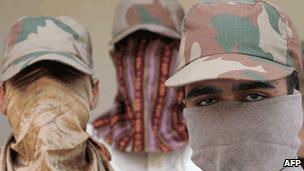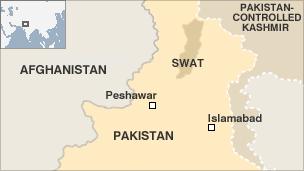Pakistan's youth taken back from the Taliban
- Published
Earlier this month, a respected Pakistani religious teacher was shot dead by Taliban militants. By the time of his death, the BBC's Orla Guerin reports, Dr Mohammad Farooq Khan's importance spread way beyond the classroom.

The Taliban abducts some youths; others volunteer
On his first day in a new school last autumn, Dr Farooq knew what he was up against. When he walked into the classroom, there was a one-line message written in Urdu on the blackboard: "I will be a suicide bomber."
The cordial and courteous Dr Farooq had just come face to face with a group of former Taliban recruits. These teenage boys were among the Taliban ranks when the militants were in control of the Swat Valley last spring.
In September, the boys went back to being schoolboys. About 80 of them were enrolled in a pioneering rehabilitation centre where Dr Farooq and other experts have been trying to "deprogramme" them. This is Pakistan's first attempt at reclaiming stolen youth. In time, the school hopes to take in up to 300 pupils.
The location is remote - deliberately so - a compound ringed by hills, and shielded by high walls, topped with razor wire. Armed troops man the gates and keep watch from the roof.
"There has been no specific threat to the centre but it is an obvious target," said an army officer based there.
'Lost generation'
A sunburst has been painted at the entrance, with the word Sabaoon - meaning new dawn, a name chosen to give a sense of hope. That is one of the key lessons for these boys, the youngest of whom is just 13. They are seen here as traumatised victims, not offenders.
"They endured torture," said Dr Feriha Peracha, the softly spoken psychologist who runs the school.
"Many of them soon became accomplices because that was one way of getting away from torture."
She said that some volunteered for the Taliban, but most were abducted, or given up by their families under duress.
Some were used as "slaves" - digging roads and tunnels. Others were errand boys or informers. The top tier was given weapons training, and took part in attacks on the army. A chosen few were being groomed as suicide bombers.
At Sabaoon, the aim is to shift their focus to this life, not the next.
"The terrorists were giving them a future after death. We want them to see a future in the here and now," said Dr Peracha.
"I know there is a lost generation and we have to win them over. In front of every madrassa [religious school] we should open another school like ours. Then I think we will win this war."
Anti-Taliban lessons
As the boys filed in and out of classes, there were glimpses of the childhood that might have been. One carried an exercise book with a Harry Potter design on the front.
The approach here is not to interrogate the boys, but to educate and counsel them.
During his weekly religious affairs class, Dr Farooq tried to erase the lessons taught by the Taliban. He quizzed attentive rows of students in starched pin-striped shirts about life under Taliban rule.
"What did the Taliban do in Swat?" he asked. Hands shot up in response. "Our houses were destroyed," one boy said. "We lost our peace, and our businesses," said another. "Innocent people were killed in the crossfire between them and the army," said a third.
"What have I taught you about the real meaning of jihad?" he asked. "It means to help someone in trouble," said one boy. "It means to be merciful," said another.
"If someone asked you to carry out a suicide bombing in the name of Islam, would you do it?" Dr Farooq asked. "No," they chorused.
Life's mission
Dr Farooq said he hoped to reach out to hardened militants across Pakistan.

"There are probably thousands of extreme militants in detention in Pakistan and all of them have got the same ideas," he said.
"We can't hang or kill them all. It is imperative that this experiment is replicated with them, and what I am teaching them must be shown on the media, on the television, and everywhere."
That interview took place in July. On 2 October, Dr Farooq paid the price for his regular and very public criticism of the militants. He was shot dead in his clinic by the Swat Taliban.
Dr Farooq was a writer, broadcaster and academic - he was vice chancellor of the upcoming Swat Islamic University. He was also a very public critic of the Taliban. He knew he was at risk. His family say he died for his cause, but was committed to his path.
"He used to give us vague pointers, that something was boiling up, but he ignored such things," said his son, Usama Ahmed Khan, in a voice heavy with grief.
"He used to say that his work at Sabaoon and the Swat University were his missions in life. He gave his life for that."
Dr Farooq had high hopes for those he taught. He believed they could return to their communities and get on with their lives. But he also believed that anyone released from the school should be carefully watched. Twelve have gone home so far.
Pakistani has been robbed of one of the few religious scholars ready to challenge the militants, but the work at Sabaoon will continue. Others will carry on trying to free teenage boys from the long shadow of the Taliban.